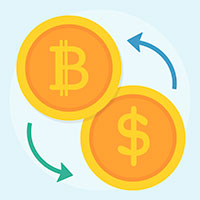When we look at global financial markets, there is always a currency that dominates the scene, that is what we call a world currency or reserve currency. The most popular world currencies today are the U.S. dollar, the yen, and the euro. However, among this three, the U.S. dollar still prevails. Why so?
The Rise of the U.S. Dollar
Long ago, all currencies were backed by gold reserves. After the World War II, United States has become the most powerful economy in the world. Since bank reserves did not have enough gold to sustain the growth of the currencies, economies started to abandon the gold standard and resorted to printed banknotes. By then, the U.S. began to produce more paper money to finance global economic growth; Thus, making the U.S. dollar the most powerful currency in circulation and sparking its rise as the world currency.
Although it does not hold an official status or is not titled as the official global currency, the U.S. dollar holds 64 percent of the known foreign exchange reserves of central banks, which makes it the world currency. The U.S. dollar held its position since it is used by more than 60% of all countries as their anchor currency.
The Dollarization
Dollarization is defined as the usage of dollar together with or as replacement of a country's domestic currency. Such event may happen even without a legal or formal approval from the U.S. government. Dollarization falls into three categories:
Official Dollarization - This happens when a country stops using their domestic currency and fully replaces it with the U.S. dollar. Some countries that exercise this are Ecuador, El Salvador and Zimbabwe.
Semi-Dollarization - This is where a country uses both the U.S Dollar and its domestic currency. Countries such as Cambodia and Lebanon are some examples.
Unofficial Dollarization - This is where the U.S. dollar is accepted in private transactions. However, they are not considered as officially legal. Most of developing countries around the world practice this.
The stability of the dollar as well as it being a world currency is the major factor why countries choose to use it as an official and unofficial currency. It also provides the country with a secure and stable economic environment.
 In today’s fast-paced financial world, responsible trading is no longer a choice; it's a necessity. Technology has opened the markets to everyone, making access incredibly easy.
In today’s fast-paced financial world, responsible trading is no longer a choice; it's a necessity. Technology has opened the markets to everyone, making access incredibly easy. For active traders and investors, mastering the art of trading volatility is a crucial skill. Volatility, in financial terms, refers to the extent to which asset prices fluctuate over time. High volatility markets experience rapid price swings...
For active traders and investors, mastering the art of trading volatility is a crucial skill. Volatility, in financial terms, refers to the extent to which asset prices fluctuate over time. High volatility markets experience rapid price swings... The global financial market operates as a dynamic ecosystem, where understanding the connections between different market movements can provide invaluable insights for forecasting...
The global financial market operates as a dynamic ecosystem, where understanding the connections between different market movements can provide invaluable insights for forecasting... The forex market, also known as the foreign exchange market, stands as the largest and most traded financial market globally. FXTM is committed to equipping our clients...
The forex market, also known as the foreign exchange market, stands as the largest and most traded financial market globally. FXTM is committed to equipping our clients... Cryptocurrency trading has rapidly grown into a bustling and dynamic market that attracts traders from around the world. With the potential for significant profits...
Cryptocurrency trading has rapidly grown into a bustling and dynamic market that attracts traders from around the world. With the potential for significant profits...